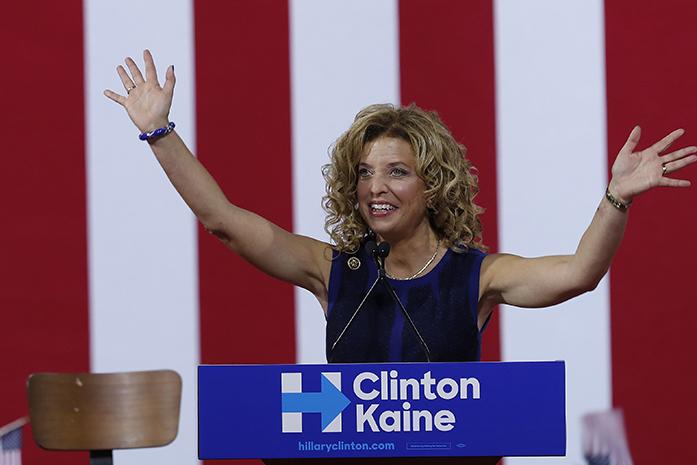By Brent Griffiths
PHILADELPHIA — Former Sen. Tom Harkin, D-Iowa, joked that in the City of Brotherly Love, his Democratic Party will end this week together. But on the eve of the 2016 Democratic National Convention, Sen. Bernie Sanders supporters are feeling scorned.
For months, backers of the Vermont senator have claimed the primary and caucus process was rigged by the party establishment. This past weekend, they received what they view as black and white evidence of this betrayal.
“What used to be thought of as some sort of fringe, conspiratorial viewpoint that the DNC had its thumb on the scale, these emails show is validated as mainstream,” said Brent Oleson, a Sanders delegate and Linn County supervisor.
Emails hacked from top Democratic National Committee staffers released by WikiLeaks appear to show moments when there was no love lost for Sanders.
During the Democratic primary, DNC Chairwoman Debbie Wasserman Schultz became the symbol of what Sanders loyalists feel was a party establishment that spurned and plotted against their beloved candidate. Shortly before Iowa delegates kicked off their time in Philadelphia, Wasserman Schultz announced that she would step down by the end of the week.
Sanders had called for Wasserman Schultz’s resignation for months. In particular, the self-described democratic-socialist felt the party planned too few debates during the primary and caucus process, not to mention scheduling them for odd times, such as six days before Christmas and the night before Martin Luther King Jr. Day. Before he dropped out of the race, Maryland Gov. Martin O’Malley was also one of the most vocal critics of the process.
“While she deserves thanks for her years of service, the party now needs new leadership that will open the doors of the party and welcome in working people and young people,” Sanders said in a prepared statement. “The party leadership must also always remain impartial in the presidential nominating process, something which did not occur in the 2016 race.”
Iowa Democratic Chairwoman Andy McGuire said the emails are unfortunate, but they will not impede the party from unifying or holding a successful convention.
“I don’t think it will actually make us even stop a beat. It is a big organization, so I thank her for her leadership, and I think we go from here,” McGuire said. “We sometimes say things we shouldn’t. I think you move past it. It is not about one person; it is about all of us collectively.”
Harkin, the featured speaker at a Sunday night event in Philadelphia with the Iowa Democratic delegation, said Wasserman Schultz was put in a tough spot by a primary contested until the end, but that allegations of a rigged process are misplaced.
“It is just a tough job, especially if you have the kind of contest we had this time,” Harkin told reporters before firing up the delegation with a quick speech. “I think overall everything was fair and above board. If it wasn’t fair, Bernie Sanders would not have carried all those states and won all those delegates.”
Besides, Harkin said, former Secretary of State Hillary Clinton’s résumé made it likely that party loyalists would be drawn to her.
“I think it goes without saying the normal structure in the Democratic Party probably leaned more towards Hillary. Look, she had been first lady, senator, secretary of State … she was sort of quietly endorsed by the sitting president of the United States, so you would imagine that it would normally go that way,” said Harkin, who retired from the Senate after serving from 1985-2015.
In one of the most talked about emails, DNC Chief Financial Officer Brad Marshall wondered how an unnamed candidate’s religion would play to voters in Kentucky and West Virginia. Given that Sanders was the only Jewish candidate and the email was sent shortly before those states’ primaries, it is likely Marshall was talking about Sanders.
This message in particular has drawn condemnation from all sides of the party, including former Secretary of State Hillary Clinton’s campaign manager, Robby Mook.
Clinton delegate and 2012 convention speaker Zach Wahls said there is no place in the party for questioning a candidate’s religion.
“The idea you would be trying to use a candidate’s religion against him is not what the party stands for,” he said. “I think it is clear that the DNC needs to clean house; I think [Wasserman Schultz’s] decision to step down will continue the process of bringing the party together.”
Before Sunday’s announcement, Wasserman Schultz had reduced her role in the party’s convention by forgoing a speech, a common practice for party heads.



